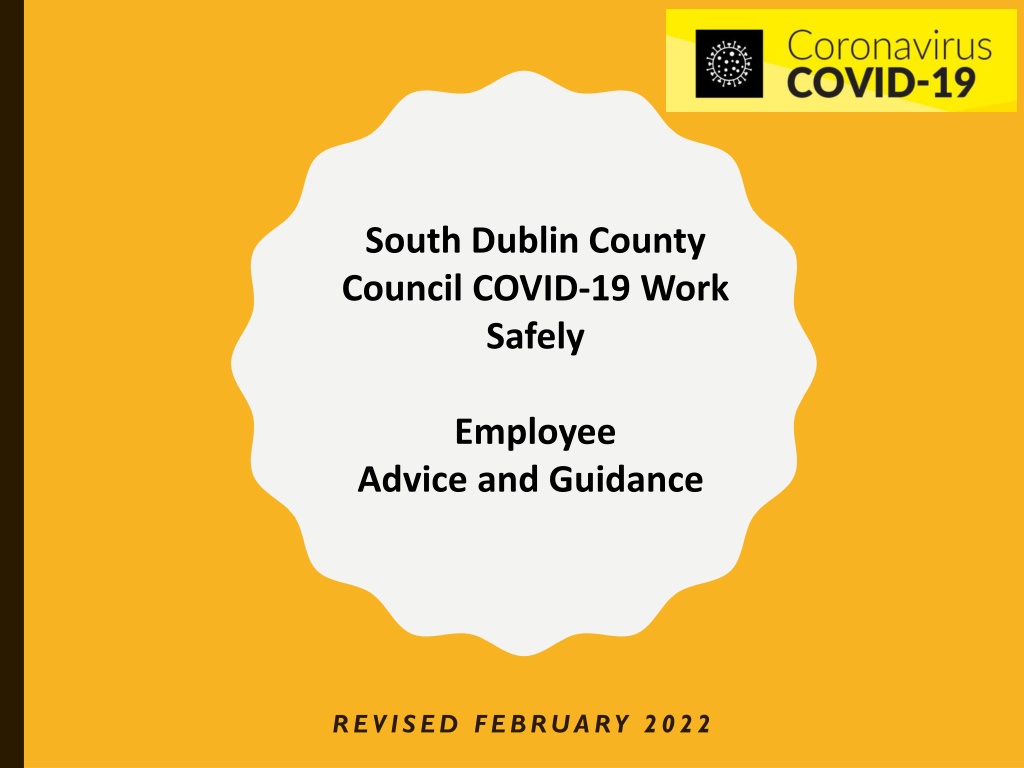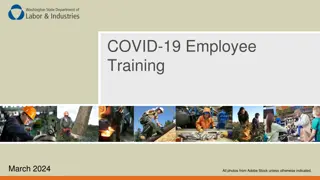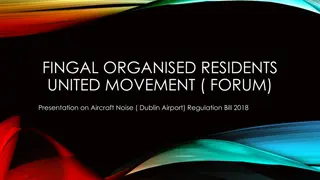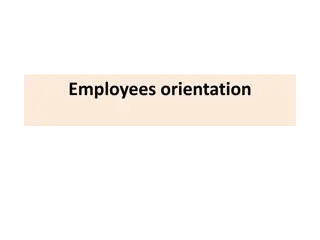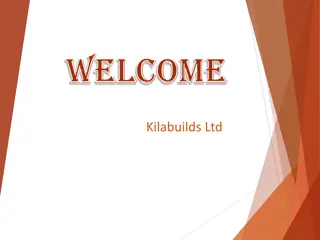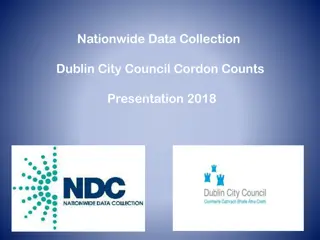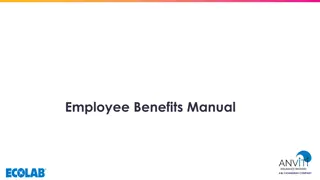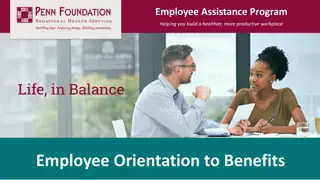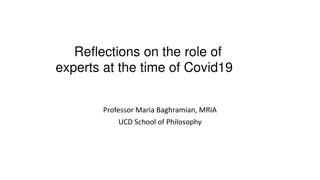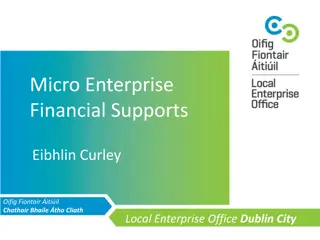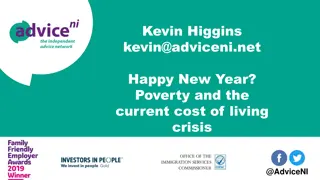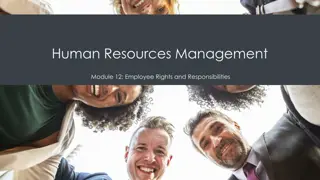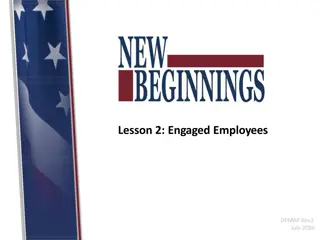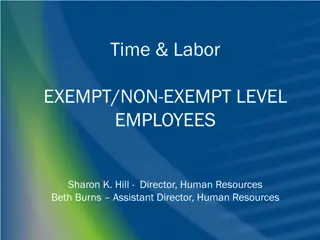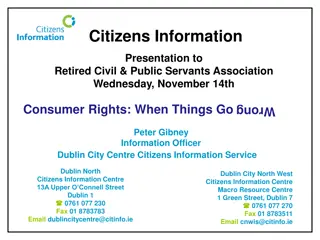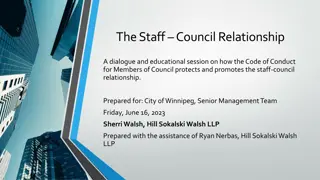South Dublin County Council COVID-19 Work Safely Employee Advice
The South Dublin County Council provides updated employee advice and guidance for working safely during the COVID-19 pandemic. It emphasizes the importance of following public health measures, recognizing symptoms, and taking necessary precautions to prevent the spread of the virus.
Download Presentation

Please find below an Image/Link to download the presentation.
The content on the website is provided AS IS for your information and personal use only. It may not be sold, licensed, or shared on other websites without obtaining consent from the author. Download presentation by click this link. If you encounter any issues during the download, it is possible that the publisher has removed the file from their server.
E N D
Presentation Transcript
South Dublin County Council COVID-19 Work Safely Employee Advice and Guidance REVISED FEBRUARY 2022
INTRODUCTION The public health management of the COVID-19 pandemic in Ireland continues to evolve in light of changing circumstances and risks. The key to a safe workplace remains strong communication of key messages and consistency in the implementation of infection prevention and control measures, including self-isolation of those displaying symptoms. New habits are already well-adopted and continued adoption of good infection prevention and control measures such as hand washing, respiratory hygiene, and ventilation is key to supporting the ongoing safe operating of workplaces. It is important that everyone continues to play their part in limiting transmission and continues to adhere to public health advice. This induction is designed to provide information on the key control measures implemented by the Council and our responsibilities that will help to prevent the spread of COVID-19.
KEY MEASURES FOR EMPLOYEES Follow current public health advice and guidance, such as good hygiene practices, frequent hand washing and respiratory hygiene to protect themselves and their work colleagues against infection. Not to attend the work premises if they are displaying signs or symptoms of COVID-19: Symptoms of COVID-19 - HSE.ie Keep themselves up to-date on the signs and symptoms of COVID-19 and monitor their own well-being. Follow the public health advice regarding self-isolation, restricting movement, testing and what to do if identified as a close contact COVID-19 (coronavirus) - HSE.ie Follow any specific measures in place to protect both yourself and to help prevent the spread of COVID-19 in the workplace Report to Line Manager immediately if any symptoms develop during work.
COVID-19 SYMPTOMS The most common symptoms are: Cough: A new cough this can be any kind of cough not just dry Other symptoms may include: Nasal congestion (runny or blocked nose) Conjunctivitis (also known as red eyes) Nausea, vomiting or diarrhoea, Aches and pains or tiredness, Different types of rash, Sore throat, Headaches, Chills or dizziness. Fever: High Temperature (38o C or above) including having chills Shortness of Breath or breathing difficulties Loss or change to your sense or smell or taste
COVID-19 SYMPTOMS You may not have all of these symptoms or your symptoms may be mild. Symptoms may vary for different age groups or variants or the virus. It can take up to 14 days for symptoms to show. You can spread COVID-19 during this time. If you have any symptoms of COVID-19 you must not attend the workplace. Self isolate and follow HSE advice, including in relation to testing and mask wearing. Contact your GP if you are in any doubt about any symptoms you have. For further information on COVID-19 symptoms please follow this link: Symptoms of COVID-19 - HSE.ie For further information on COVID-19 testing please follow this link: Get tested for COVID-19 - HSE.ie
CLOSE CONTACTS If you have been in contact with someone who tested positive for COVID-19, you will get a text message from the HSE. Follow the HSE advice set out at: If you are a close contact of COVID-19 - HSE.ie. For the latest up to date public health advice for close contacts including testing, mask wearing and other protective measures see: If you are a close contact of COVID-19 - HSE.ie
PROTECTION AGAINST GETTING COVID-19 The best ways to prevent the spread of COVID-19 in a workplace or any setting is through prevention measures such as wearing masks/coverings, respiratory etiquette, increasing ventilation and staff themselves deciding to be vaccinated. Hand Hygiene Use soap and water or alcohol hand sanitiser to clean your hands regularly. This will help stop the spread of COVID- 19 and other viruses and bacteria. Many hand sanitisers are alcohol based and highly flammable. Do not use near heat or a naked flame. Watch this short video demonstrating how to wash your hands properly, and help prevent the transmission of COVID-19: https://youtu.be/IsgLivAD2FE Cough Etiquette - when coughing / sneezing, cover your mouth and nose with your bent elbow or a tissue. Place used tissues into a closed bin and wash your hands. Clean and disinfect frequently - touched objects and surfaces should be regularly cleaned. Keep your environment clean.
VENTILATION Ventilation refers to the movement of outdoor air into a building, and the circulation of that air within the building or room while removing stale air to improve the air quality. This can be achieved through natural means (e.g. opening a window) or by mechanical means (e.g. HVAC systems). The primary principle for improving ventilation is to minimise transmission, so that the level of fresh outside air should be maximised therefore reducing the level of recirculated air in the workspace Adequate supply of fresh air (ventilation) in enclosed areas of the workplace can be achieved by: Natural ventilation which relies on passive air flow through windows, doors and air vents that can be fully or partially opened. This is the simplest way to ensure adequate air quality in poorly ventilated areas. Care needs to be taken at all times to ensure security and safety measures. Mechanical ventilation using fans and ducts including window fans to bring in fresh air from outside, A combination of natural and mechanical ventilation, for example where mechanical ventilation relies on natural ventilation to maximise fresh air. It is not a standalone measure and continued adherence to other Public Health advice such as hand-washing, surface cleaning and respiratory etiquette.
VACCINTATION AGAINST COVID-19 Public health advice still emphasises that vaccination against COVID-19 remains a key element to not only protect the individual from serious illness but also in protecting the wider community too. The HSE is responsible for the roll out of the vaccination programme and specific information and resources are available at the below links: Check hse.ie/covid19vaccine for information about the vaccine Find the vaccine information material: at www.hse.ie/covid19vaccinematerials Details on getting the COVID-19 vaccine is updated regularly here
PROTECTION AGAINST GETTING COVID-19 FACE COVERINGS All types of masks, including cloth masks, can significantly reduce community transmission if properly made, well fitted, and appropriately worn. By law, you have to wear face mask/coverings in certain places such as on public transport, in shops, taxis, public offices, libraries and in some other indoor settings. Face coverings are also recommended when staying apart from people is difficult and in shared work areas, during breaks, in locker and toilet areas and if travelling together for work. This is as an extra preventative measure. Wearing a face covering is not a substitute for other control measures. If you wear a face covering you should still do the important things needed to stop the spread of the virus: Covering mouth and nose with a tissue or your sleeve when you cough or sneeze Washing hands often and properly Not touching your eyes, nose or mouth if your hands are not clean If face coverings are worn, they should be clean and they should not be shared or handled by other colleagues. There are many different types of masks (medical grade masks, respiratory/FFP2 masks and cloth masks. Follow this link for further information: gov.ie - When to wear face masks and how to make them (www.gov.ie)
PROTECTION AGAINST GETTING COVID-19 Travelling for work and mobile plant - When more than one per person per vehicle, the following measures should be followed: Face mask/covering to be worn. Employees should not enter a work vehicle with others if they have any symptoms of COVID-19. Keep windows of vehicles open, at least partially. Key touch points in vehicles / mobile plant are to be wiped regularly (e.g. door handles, steering wheel, handbrake, gear stick, radio controls). Hygienic wipes will be available for this purpose. Hand Hygiene sanitise hands regularly. Cough Etiquette - when coughing / sneezing, cover your mouth and nose with your bent elbow or a tissue.
PROTECTION AGAINST GETTING COVID-19 Work Environment - We must all work as a team. Throughout your day you should: Continue to maintain hand hygiene by washing your hands regularly and following respiratory etiquette. Keep your own workspace clean and disinfected. Regularly clean high touch surfaces Equipment, tools and plant - Keep equipment, tools and plant clean and don t share unless sanitised. Cleaning materials are made available for this purpose. Keep hands sanitised regularly.
PROTECTION AGAINST GETTING COVID-19 Welfare Facilities - When using welfare facilities such as canteen, toilets, drying rooms practice good respiratory hygiene and cough etiquette and be respectful of others using these areas. Canteen: Employees should sanitise their hands before and after eating. Cleaning materials will be provided, please clean area when finished break/s and dispose of rubbish appropriately. Do not share objects that touch your mouth e.g. bottles, cups Always be vigilant of sources of contamination.
WELLBEING Infectious disease outbreaks like COVID-19, can be worrying and can affect your mental health. As well as our Occupational Health Service and Employee Assistance Programme, there are many public resources available which can be accessed at the links below. Mental health supports and services during COVID-19: https://www2.hse.ie/wellbeing/mental-health/minding-your-mental-health- during-the-coronavirus-outbreak.html https://www.gov.ie/en/campaigns/together/?referrer=/together/ https://www.hse.ie/eng/services/list/4/mental-health-services/connecting- for-life/news/supports-and-services-during-covid-19.html
KEY POINTS OF CONTACT IN SOUTH DUBLIN COUNTY COUNCIL FOR COVID-19 ISSUES We are here to help and advise with providing support in relation to COVID-19 Contact any of the following for advice and guidance: Line Manager Health and Safety Officer Attendance Management Unit HR Lead Worker Representative Your local trade union reps
